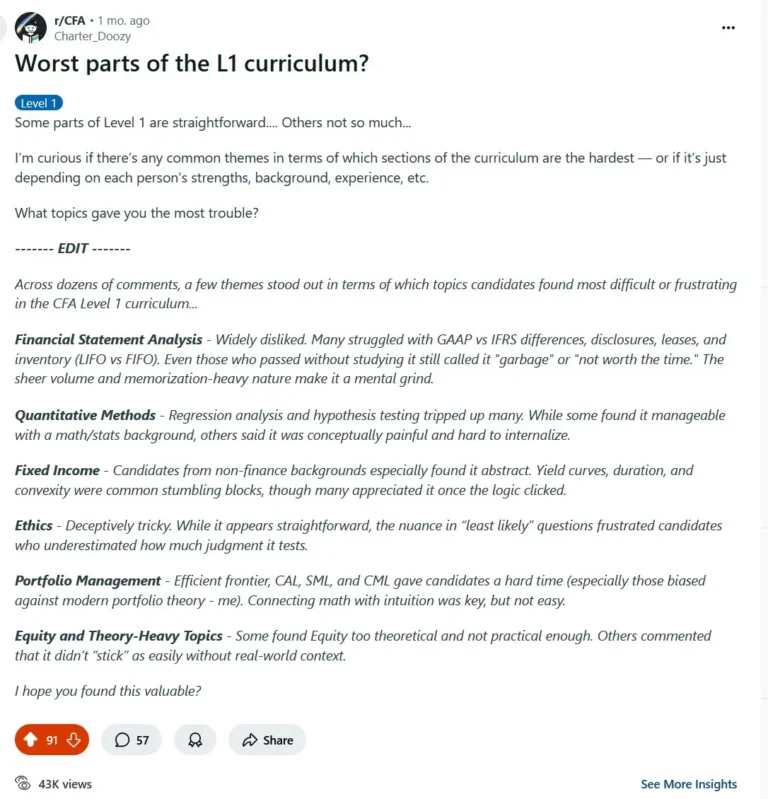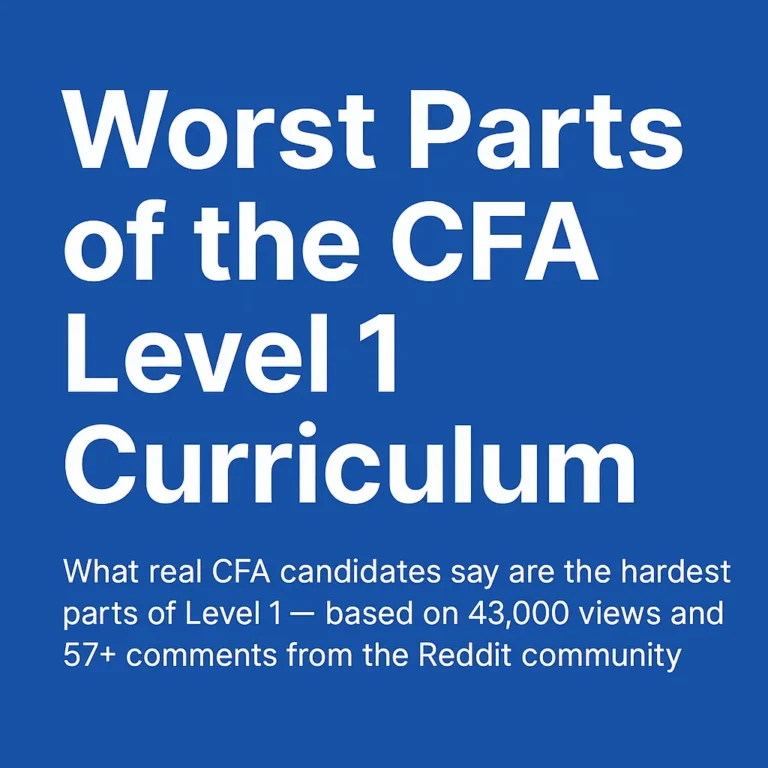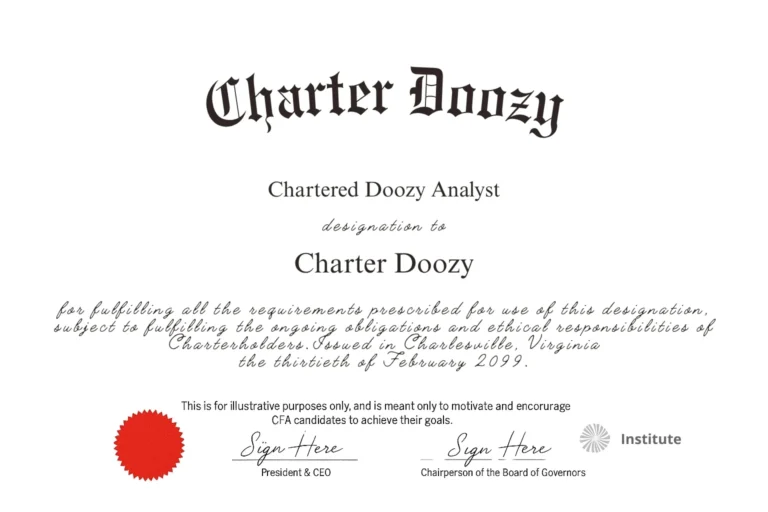Every CFA candidate knows that Level 1 is no joke. The curriculum is broad, the volume is intense, and the learning curve is steep.
But which topics are the hardest?
A viral Reddit post on r/CFA sparked a wave of brutally honest feedback. With over 43,000 views, 91 upvotes, a 98% upvote ratio, 57 comments, 130 shares, and 5 crossposts, this thread became a crowdsourced confessional for CFA Level 1 survivors.
We analyzed the replies — and the themes are clear.
Here’s what real candidates found most confusing, frustrating, and mentally exhausting in the Level 1 curriculum.

Financial Statement Analysis (FSA): The Universal Villain
This was, by far, the most disliked section.
“FSA. I didn’t study it and still passed. I will now do L2, not do FSA, and pass again. F*** FSA.” – u/CurrencySwapEnjoyer
FSA asks you to learn two sets of accounting rules (GAAP and IFRS), wrap your head around deferred taxes, leases, inventory (LIFO/FIFO), and memorize dozens of disclosures.
Many found it mind-numbing and dense – a “brute force” memorization challenge that didn’t feel worth the time.
Why it’s hard:
GAAP vs. IFRS differences are dry and detailed
LIFO/FIFO impacts ripple across ratios, margins, and valuations
Requires stamina for disclosure-heavy case studies
Feels more like an accounting exam than finance
Yet, despite the hate, experienced candidates warn: ignore FSA at your own risk. It’s foundational for valuation and will come back with a vengeance in Level II.

Quantitative Methods: Divide and Conquer (If You Can)
Some candidates aced it. Others felt ambushed.
“Quant is a pain in the ass… I forget the formulas mid-calculation.” – u/Big_Put_8421
“Regression formulas? Confusing names. Just memorize and pray.” – u/Nicolasgkr1
Quants divides candidates into two groups: those with a stats background, and those stuck googling p-values.
Regression, hypothesis testing, ANOVA tables, and different types of t-tests caused the most headaches.
Why it’s hard:
Conceptual thinking and formula recall needed
One small error can collapse a whole question
Difficult to retain without repetitive practice
Can be deceptively long in exam time
The ones who succeeded didn’t necessarily read more. They practiced more.
Fixed Income: Abstract Until It Snaps Into Place
Fixed Income confused many — especially those from non-finance backgrounds.
“Yield curves, duration, convexity… It takes time. But once it clicks, it’s elegant.”
Initially intimidating due to technical jargon and interlinked formulas, Fixed Income became a sleeper favorite for some once they started doing problems.
Why it’s hard:
New concepts like duration and convexity feel abstract
Visual intuition is hard to build from static text
Requires time to develop a feel for the math
Once mastered, candidates said this topic felt “solid and logical.” But that first step? Brutal.
Ethics. Looks Easy, But Isn’t
The CFA Institute loves to trick you in Ethics.
“Looks easy until you hit those ‘least likely’ questions where every option feels kind of right…”
Ethics appears readable and manageable, but the exam questions are deceptively nuanced.
Candidates underestimate the judgment required and often skip over this until it’s too late.
Why it’s hard:
“Least likely” or “most appropriate” questions are ambiguous
Requires judgment, not just memorization
Rushing leads to easy mistakes
One of the biggest regrets among candidates was under-preparing for Ethics – and learning the hard way that it’s not about reading more, it’s about thinking smarter.

Portfolio Management: Alphabet Soup of Acronyms
Efficient frontier. CAL. CML. SML. SCL.
“I had to put my Buffett/Munger beliefs aside and just trust the math.”
Candidates found Portfolio Management challenging due to both ideological bias (against EMH assumptions) and the sheer confusion of similarly named concepts.
Why it’s hard:
Concepts overlap but aren’t interchangeable
Graphs and acronyms dominate
You must connect formulas to intuition
Once you strip out philosophical objections and just follow the math, it becomes manageable. But that’s easier said than done.
Bonus Headaches
Several other topics came up repeatedly:
Derivatives: Tough without trading experience. Put-call parity tripped many.
Currency Exchange: Confusing conversions and cross-rates.
Deferred Taxes: So hard it needs multiple videos to explain.
Equity Valuation: Theoretical, dry, and hard to retain.
Alternative Investments: Simple until you hit performance fee calculations.
What This All Means for You
The comments were raw, real, and often hilarious — but also full of wisdom. Here’s what we learned from this 43,000-view thread:
| Topic | Pain Point |
|---|---|
| FSA | Memorization overload, GAAP vs. IFRS |
| Quant | Regression formulas, hypothesis testing |
| Fixed Income | Abstract concepts until they “click” |
| Ethics | Deceptively tricky phrasing |
| PM | Acronym confusion, MPT bias |
| Derivatives | Tough without market exposure |
| Currency | Confusing conversions and applications |
Final Thoughts
The CFA Level 1 curriculum is wide — and sometimes overwhelming. But knowing what trips most people up can help you approach those areas with better strategy, mindset, and preparation.
So whether you’re grinding through quants or cursing accounting standards, just know — you’re not alone. And if you ever need a little solidarity or strategy, the CFA Reddit community is a good place to turn.

